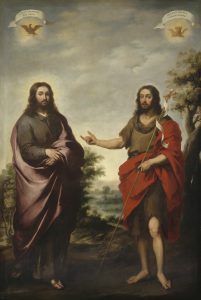
Jesus told a crowd in Matthew 11:7-14 that John the Baptist had been “the Elijah who was to come” and that has led many people to wonder if John was the actual re-appearance of the great prophet Elijah from the Ninth Century B.C. whose amazing deeds are described in First and Second Kings.
Ministers Greg Fleming and Gian Carlo Villatoro say there were striking similarities, but they were not literally the same man.
“God’s message through the prophet Malachi to a faithless post-exile people is that he loves them enough to refine them,” said Fleming, minister of Downtown Church of Christ in Midland. “On this coming day of cleansing God will both judge the evil and heal the God-fearing, Malachi 4:1-2.
“Previous to this day he will send a messenger, whom he terms ‘Elijah,’ to prepare the way by turning hearts before the great and dreadful day of the Lord comes. This prophetic message triggers a growing anticipation for this Elijah to make his appearance that reaches its climax in First Century Palestine, which is occupied by the Roman Empire.”
Fleming said that like Elijah, John wore a garment of hair girded with a leather belt, Second Kings 1:8 and Matthew 3:4.
“Though both Elijah and John confront powerful corrupt royals, only one of them survives the confrontation,” he said. “Another distinction is that while Elijah is associated with several notable miraculous signs, among them raising the dead and crossing the River Jordan on dry land, Jesus says John ‘did no sign,’ John 10:41.
“In light of these differences my conclusion is that though John is indeed like Elijah as the preparatory messenger spoken of by Malachi, he is not one and the same as Elijah.”
Fleming said it may logically be speculated that John the Baptist was literally Elijah returned to the world in the form of John, given that Elijah was directly translated to the realm of God and never died, but was carried to Heaven in a fiery chariot.
“However, for the reasons I mention I think John functions like Elijah, but is not the prophet himself,” he said.
The Rev. Villatoro, pastor of Victory Church, said the first similarity between the two is that both were eccentric.
“We understand that everyone has his own personality, but Elijah had one very peculiar personality as did John the Baptist,” Villatoro said. “Some people might say they were too much into themselves, but what can you do with someone who is absolutely passionate about God and God’s calling for his life?
“They were also very strong about the message they needed to share with Israel. They were willing to do anything and confront anyone in order to give the message that the Lord God gave them.”
Villatoro said they had great faith and were able to see things that only a few other prophets saw.
“Elijah saw a miracle of rain being stopped and rain coming back to earth,” he said. “He saw fire coming down from Heaven to burn his sacrifice and he killed pagans with the strength of God like nobody else did.”
The pastor said John “was filled with the Holy Spirit since he was in his mother’s womb and he had a diet like nobody else had.
“John delivered the most direct message from God in public to a political leader like nobody else did,” he said. “But there is one big difference: John was willing to see others growing and becoming better than him, but Elijah was not too much into receiving that type of anointing.”
Villatoro said the comparisons raise questions that Christians should ask themselves.
“Am I doing what the Lord God wants me to do?” he asked. “Am I afraid of becoming eccentric or weird by obeying Him? And more importantly,when the time comes for tough decisions, are you willing to give your life for the Lord like they did?”



